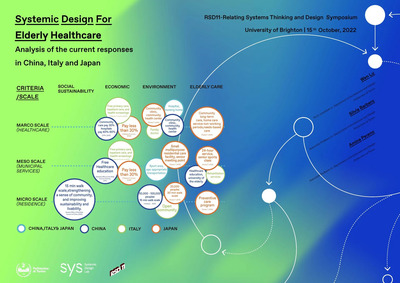Systemic Design For Elderly Healthcare: Analysis of the current responses in China, Italy and Japan
Lu, Wen, Barbero, Silvia and Pereno, Amina (2022) Systemic Design For Elderly Healthcare: Analysis of the current responses in China, Italy and Japan. In: Proceedings of Relating Systems Thinking and Design, RSD11, 3-16 Oct 2022, Brighton, United Kingdom.
Preview |
Text
Lu_Elderly_paper_2022.pdf Available under License Creative Commons Attribution Non-commercial No Derivatives. Download (1MB) | Preview |
![Lu_Elderly_poster_2022.png [thumbnail of Lu_Elderly_poster_2022.png]](https://openresearch.ocadu.ca/4534/2.hassmallThumbnailVersion/Lu_Elderly_poster_2022.png)  Preview |
Image
Lu_Elderly_poster_2022.png Available under License Creative Commons Attribution Non-commercial No Derivatives. Download (1MB) | Preview |
Abstract
Accompanied by the continuous changes in society, environment, culture, science and technology, the changing demographic structure of the world is also leading all countries to face multi-level cross-cutting and comprehensive challenges from the social, economic and environmental perspectives because of the increasing ageing of the population. Few studies use a systemic design approach to discuss the gaps in healthcare policy under different political regimes, thus expanding the discussion of the complex social, economic and environmental problems that elderly people face in community care. The knowledge generated through ageing research has huge potential for improving individual lives and society (Editorial,2021). In contrast, cross-cutting policy gaps are especially relevant to improving the quality of life of elderly people, the quality of healthcare – and the quality of nursing staff in community care. The paper adopts a deductive research methodology, starting from the general perspective of cross-cutting policy gaps, criteria-specific gaps and systemic design contribution, and outlines the systemic challenges of population ageing in China, Italy and Japan. The research cross-analysed models of cross-scale community care and community care stakeholder map derived from differences in healthcare policies and levels of sustainability under different political regimes in China, Italy and Japan. A holistic vision of sustainable healthcare should not consider only the treatment’s social, economic and environmental impacts. It should also take into consideration the care seekers and care providers in relation to their context by analysing the interactions they establish among them and with the context itself, assessing the influences from and consequences they generate on it. The systemic design approach is built around four additional key principles that contribute to environmental, social and economic sustainability (Silvia B. & Agnese P.,2017). Therefore, this paper attempts to add key criteria for whether healthcare policy considers elderly care, which mainly considers whether community care can reduce the burden on home care stakeholders brought about by long-term care and whether it considers effective age-appropriate design.
| Item Type: | Conference/Workshop Item (Paper) |
|---|---|
| Uncontrolled Keywords: | elderly people, healthcare, population ageing, community care, policy gaps, systemic design |
| Divisions: | Faculty of Design |
| Date Deposited: | 23 May 2024 16:54 |
| Last Modified: | 23 May 2024 17:00 |
| URI: | https://openresearch.ocadu.ca/id/eprint/4534 |
Actions (login required)
 |
Edit View |

 Lists
Lists Lists
Lists